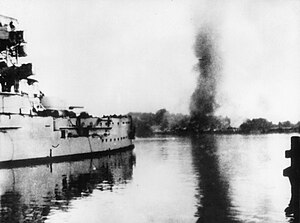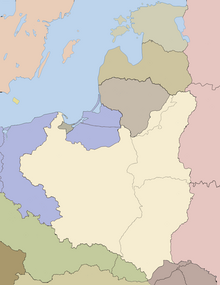
Back معركة ويستربلات Arabic وسترپلاته دؤیوشو AZB Абарона Вестэрплятэ Byelorussian Бітва за Вэстэрплятэ BE-X-OLD Битка за Вестерплате Bulgarian Emgann Westerplatte Breton Bitva o Westerplatte Czech Kampf um die Westerplatte German Μάχη του Βέστερπλαττε Greek Sieĝo de Westerplatte Esperanto
| Battle of Westerplatte | |||||||
|---|---|---|---|---|---|---|---|
| Part of the Invasion of Poland of World War II | |||||||
 German battleship Schleswig-Holstein firing her guns, 5 September 1939 | |||||||
| |||||||
| Belligerents | |||||||
|
|
| ||||||
| Commanders and leaders | |||||||
|
|
| ||||||
| Strength | |||||||
|
c. 3,400 1 battleship[1] 2 torpedo boats 60 aircraft | 182–240 | ||||||
| Casualties and losses | |||||||
|
50 killed[1] c. 150 wounded |
15 killed[1] 20 wounded[1] 155–185 captured | ||||||
Location in Poland, 1939 borders | |||||||
The Battle of Westerplatte was the first battle of the German invasion of Poland, marking the start of World War II in Europe.[1] It occurred on the Westerplatte peninsula in the harbour of the Free City of Danzig (now Gdańsk, Poland).
In the mid-1920s, the Second Polish Republic established the Polish Military Transit Depot (Wojskowa Składnica Tranzytowa, WST) on the Westerplatte peninsula in the Free City of Danzig. Beginning on 1 September 1939, the German Wehrmacht and Danzig Police assaulted the WST. Despite initial assessment on both sides that the Polish garrison might hold out for several hours before being reinforced or overwhelmed, the Poles held out for seven days and repelled thirteen assaults that included dive-bomber attacks and naval shelling.
The defence of the Westerplatte was an inspiration for the Polish Army and people in the face of German advances elsewhere and is still regarded as a symbol of resistance in modern Poland. The Polish government is planning to open a dedicated public museum on the site in 2026.
